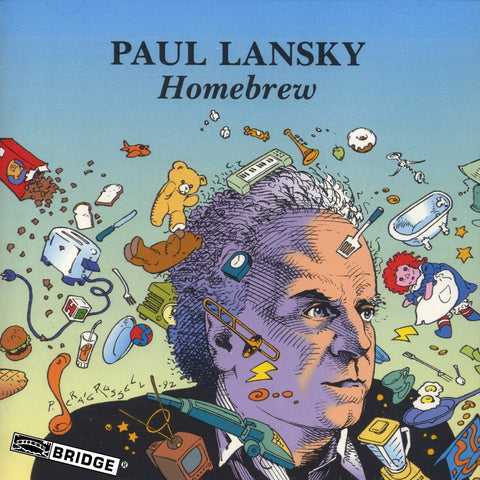
Followers of Bridge's releases during the past three decades will notice that we have released more Paul Lansky discs than any other composer (with the exception of our "complete" George Crumb Edition). My fascination with Paul's music began when he sent us what would become "Homebrew" (BRIDGE 9035). The music on the disc appealed to me on a number of levels, not the least of which was Paul's very fresh view of harmony. Who could resist the dreamlike atmosphere of Night Traffic's highway of ghost-like chords, hurtling past us and disappearing into a neon horizon? I certainly couldn't, and knew I had found a composer I wanted to get to know.
And so, I got to know Paul. I asked him to write me a short dance piece, for my guitar album, Newdance. He wrote me Crooked Courante, which was beautifully composed for the instrument. When I asked him about how he knew his way around the guitar so well, Paul answered that he had played folk guitar as a kid, but that no one had ever asked him to write guitar music before. As it turns out, the little Courante unleashed a flood of guitar music from Paul's pen. Five more movements followed, forming his Semi-Suite, a piece I later recorded. My favorite movement was always a slow one- Partly Pavane.


I've always loved Paul's chatter pieces. They're like being in a small room filled with chanters and singers, each vocalizing his or her own mantra, and by seeming coincidence, landing on harmonies or syllables that come together to form a wild musical dance. "Chatter of Pins" is Paul's most recent piece in this genre. He writes:
"Chatter of Pins is a response to an invitation by Keith and Mendi Obadike to contribute a track to their anthology of music inspired by hiphop (it will also appear there). I took some of the compoenents of rap (at least as they seemed to me): a backdrop made of circling tunes appearing against a rhythm track, and a rhythmically spoken text that is hard (for me) to understand, and put them together in my own terms. The text, spoken by me and by my wife Hannah MacKay, is from an old English folksong, A Paper of Pins, in which a suitor woos a maid with different proposals, only to meet rejection until he offers her the key to his desk, and consequently, his money. She accepts but he then declines when he realizes she loves his money more than him. The text becomes clearer as the piece evolves, but don't worry if you don't get it all (you're not supposed to). I chose the text because of its particular emphatic rap-like rhythmic structure. The piece is, for all intents and purposes, the nth in my "Chatter" series.

"Chatter of Pins is a response to an invitation by Keith and Mendi Obadike to contribute a track to their anthology of music inspired by hiphop (it will also appear there). I took some of the compoenents of rap (at least as they seemed to me): a backdrop made of circling tunes appearing against a rhythm track, and a rhythmically spoken text that is hard (for me) to understand, and put them together in my own terms. The text, spoken by me and by my wife Hannah MacKay, is from an old English folksong, A Paper of Pins, in which a suitor woos a maid with different proposals, only to meet rejection until he offers her the key to his desk, and consequently, his money. She accepts but he then declines when he realizes she loves his money more than him. The text becomes clearer as the piece evolves, but don't worry if you don't get it all (you're not supposed to). I chose the text because of its particular emphatic rap-like rhythmic structure. The piece is, for all intents and purposes, the nth in my "Chatter" series.

Paul's recent "Contemplating Weather" for chorus and chamber ensemble takes the crazy voices of the chatter pieces, and places them in a concert hall with real text to sing. Jonathan Greene's poems about weather and our planet have inspired one of Lansky's finest works to date. It's worth quoting his notes:
"It used to be that when we encountered bad weather it was just considered bad luck. After all we've always had life-threatening snowstorms and killer hurricanes now and then. Now, however, we've been breaking some records and some of these events are bad news, not just bad luck. Our very brilliant species that figured out some universal laws of physics and mathematics and built a culture that could give birth to the genius of Mozart, has gotten itself into a bit of a bind. "Contemplating Weather" is not, however, a lament over our lost innocence but rather a look back at the days when bad weather was just bad luck and good weather could be a sublime experience."

